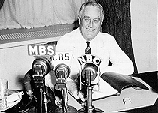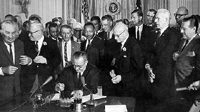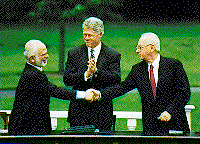

 Abraham Lincoln, our
16th President, was in office during the Civil War. The Civil War was
fought because many of the states could not agree on the issue of
slavery. President Lincoln wanted all Americans to be free, so he signed
the Emancipation Proclamation, which freed the slaves. President Lincoln
was assassinated by John Wilkes Booth on April 14, 1865.
Abraham Lincoln, our
16th President, was in office during the Civil War. The Civil War was
fought because many of the states could not agree on the issue of
slavery. President Lincoln wanted all Americans to be free, so he signed
the Emancipation Proclamation, which freed the slaves. President Lincoln
was assassinated by John Wilkes Booth on April 14, 1865.
 Franklin Roosevelt
was elected President four times. He held office from 1933 to 1945 and
lived in the White House for more than twelve years. He helped create
jobs for people during and after the Great Depression and served as
Commander in Chief during World War II.
Franklin Roosevelt
was elected President four times. He held office from 1933 to 1945 and
lived in the White House for more than twelve years. He helped create
jobs for people during and after the Great Depression and served as
Commander in Chief during World War II.
When John F. Kennedy
was President, from 1961 to 1963, he sent the first Americans into
space. He also started the Peace Corps.
 President Lyndon
Johnson signed the Civil Rights Act of 1964, which prohibits racial
discrimination in voting, education, and other areas.
President Lyndon
Johnson signed the Civil Rights Act of 1964, which prohibits racial
discrimination in voting, education, and other areas.
As President, Richard
Nixon opened relations with the People's Republic of China and
traveled to the Soviet Union to sign an arms limitation agreement.
President Ronald
Reagan started talks with the Soviet Union that led to the signing of
the Intermediate-Range Nuclear Forces (INF) Treaty in 1987. This treaty
reduced the number of nuclear missiles held by the United States and the
Soviet Union.

On September 12, 1994, President Bill Clinton
launched his national service program, AmeriCorps, which provides
opportunities for young people to serve in their communities in exchange
for credit for education or job training.
 President Clinton facilitated negotiations between Israel and Jordan that
helped end more than forty years of hostilities between these two
nations. This historic handshake, between Jordan's King Hussein and
Israel's Prime Minister Rabin, gave the world new hope for peace in the
Middle East.
President Clinton facilitated negotiations between Israel and Jordan that
helped end more than forty years of hostilities between these two
nations. This historic handshake, between Jordan's King Hussein and
Israel's Prime Minister Rabin, gave the world new hope for peace in the
Middle East.